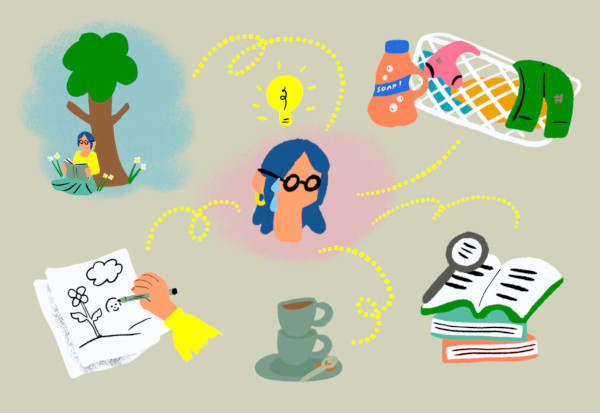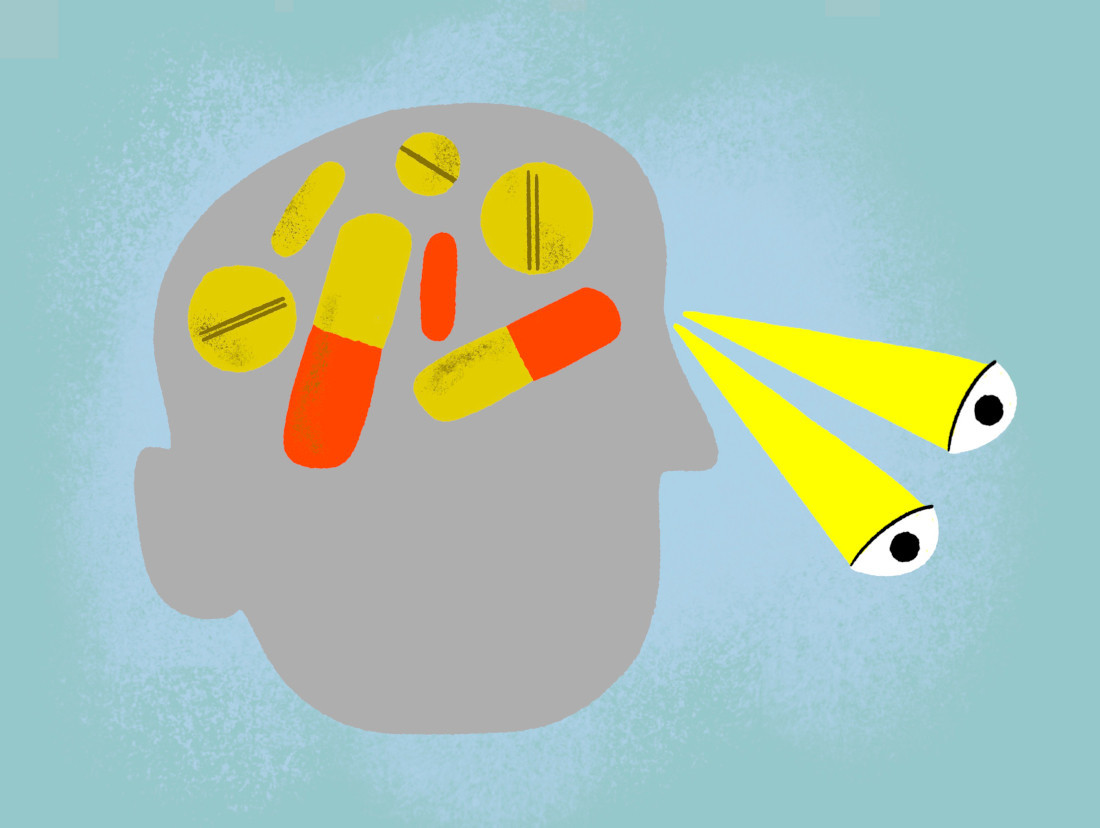A quick fix?
Using stimulants as study aids
University of Winnipeg student Reese Estwick self-medicated with caffeine before getting her ADHD diagnosis and helpful prescriptions. (Supplied photo)
“It’s not just a focus thing. It’s emotional regulation,” she says. While medication does help, it isn’t a cure for all her symptoms.
ADHD symptoms typically start in childhood, presenting as hyperactivity, impulsivity and difficulty concentrating.
“It’s like, oh, I wanted to put my cup in the dishwasher, but I ended up doing the laundry, colouring a picture, going outside, and then I didn’t even remember what I was going to do in the first place, and the things never get done,” Estwick says. “It’s the same for schoolwork.”
Misinformation and stereotypes impact whether students seek ADHD diagnoses. “There’s been this idea that ADHD isn’t really a disorder. It’s just kids being kids, or it’s an excuse to push pills,” Cameron Cannon, a master’s political-science student, says. Cannon attends York University and was diagnosed with ADHD about six months ago.
“I think a lot of people see ADHD as being something where five-year-old boys (are) bouncing off the wall,” Estwick says. “ADHD in girls, specifically, as well as adults ... doesn’t show up in that hyperactivity way, or it doesn’t for me.” Estwick also struggles with internalized ableism as a result of her accomplishments. “People are like, oh, well you’re too calm to have ADHD, you’re too smart to have ADHD, you’re too put together, too accomplished, and I think that it really is invalidating.” Still, both Estwick and Cannon find that their medication helps. “It’s almost like a wind of clarity that comes over me,” Estwick says. “I feel the most functional I’ve ever felt,” Cannon says.
“If you can get away with not having to use, that’s a plus”
“I self-medicated with Red Bull long before I knew I had ADHD,” Estwick says. “I think for a lot of students, there’s this idea that drugs like Adderall or Ritalin give you this really quick fix similar to pounding a mega-sized Red Bull.”
“There’s a bit of a false thing going around that if the stimulants work on you, it means you have ADHD. No,” Bryce Koch, a provisional nurse practitioner working in substance-use disorder settings in Vancouver, says. “Stimulants will work on everyone.”
According to Koch, some studies show that taking methylphenidate makes people without ADHD feel like they’re getting a lot accomplished, because, in indirect ways, these medications increase dopamine levels. “Dopamine is a happy drug.” Yet productivity levels remain the same.
“If you have a mental diagnosis, whether that be anxiety, depression, bipolar, schizophrenia, stimulants will destabilize you,” Koch says. “If it’s something that you can get away with not having to use, that’s a plus.”
“There’s a lot of pressure for students to be successful”
There are many counterfeit ADHD drugs in circulation. Provisional nurse practitioner Bryce Koch says getting drugs tested can make their use safer. (Supplied photo)
Proponents of harm reduction recognize that drug use is normal. “Harm reduction is a person-centred ideology,” Koch says. “It’s taking something that has an innate harm with it and reducing those harms without stopping the behaviour.”
The University of Winnipeg supports harm reduction, Inga Johnson Mychasiw, the director of Student Support Services, says. Counsellors have harm-reduction training, and other staff members are instructed to use a non-judgmental approach and may refer students to other services in the city.
“University is stressful for everyone,” Johnson Mychasiw says. “There’s a lot of pressure for students to be successful.” For example, high grades can offer a competitive profile for graduate school and in the job market. This drive to succeed might come from the students themselves or from their families.
However, this pressure to be successful harms students more. “It breeds this really unhealthy, toxic study culture that students have glorified,” Estwick says.
“Can I just try one to see what happens?”
According to Johnson Mychasiw, the Student Support Service staff have not heard about students using stimulants as study aids. “I would imagine that’s something that students likely are not comfortable sharing casually.”
“I was open about my ADHD medication at the start,” Koch, who was diagnosed in Grade 1, says. “People would always come up to me and try to get some off me. No, I needed it for myself.”
Even strangers would ask Koch for his meds.
“I haven’t had that experience yet,” Cannon says. “And I say ‘yet’ because I have many friends who have ADHD. They all have stories about it. I have even been that person. Like, please, can I just try one to see what happens?”
Estwick is also careful about keeping her medication concealed, but she understands why others might sell theirs. “I’m sure, in this economy, someone needs the $10.”
“There’s this constant fear of being labelled as drug-seeking”
For students unable to manage on their own, Koch recommends seeing a medical professional. “If you need (help or medication), tell your doctor,” he says. “Being honest with them about what you’re trying to get out of it, what your needs are, that can help, that can go a long way.”
However, prescriptions can be hard to come by, especially for Indigenous people. “There’s just a thing with the difficulty of accessing medication that’s derived from this sort of stigma of drugs and the war on drugs in general,” Cannon says. “I’m an Indigenous person, so I feel like it’s probably less (difficult) for maybe white people or other folks.
“As a patient, there’s this constant fear of being labelled as drug-seeking, which can get you locked out of treatments. I put off even trying to get a diagnosis for four years, because I felt I couldn’t approach my doctor without being accused of seeking drugs.”
“I was crushing up my medication, snorting it”

However, some prescribed stimulants are slow-release, meaning the medication lasts over a long period of time. Some students find alternative ways to consume their medication to decrease the release time and get the helpful effects faster.
“I was crushing up my medication, snorting it, always used within the confines of studying,” Koch says. “I started to develop a bit of a problematic relationship with stimulant use.”
Snorting drugs carries some risks. “You’ll get a decreased sense of smell, and that tends to be pretty permanent. Make sure to clean out your nostrils with water.”
Koch advises anyone experiencing chest pains or hallucinations while using stimulants to go to the hospital. “Your relationship with substances is starting to get a bit problematic, so you want to get that checked out.
“Remember that professors are compassionate people”
“It’s okay to ask for help,” Johnson Mychasiw says. “Education is super important, but it’s not everything.”
For example, students might volunteer, work, see friends, exercise, practice hobbies, all of which “might reduce that pressure as well.” After all, “University is supposed to be even a little bit fun, or maybe a lot fun.”
“When students are taking courses that they’re really enjoying, or in a program they really enjoy, then they may find that less stressful or less pressure because they’re enjoying getting into the work, and they’re meeting people with like interests.”
“I found a good study group to study with that helped me develop good study habits to rely less on my medication,” Koch says.
“It’s going to be stressful regardless to a degree, but that stress can be reduced a little bit if (students) get some support around their study skills and their time management so that they can feel a bit more prepared all along and can be better able to meet those deadlines,” Johnson Mychasiw says. For example, students can seek support from counsellors on campus or talk to Student Success Advisors. Students can also ask for extensions on their assignments. “Remember that professors are compassionate people.”
“We’ve been working on developing a more comprehensive mental-health strategy for the campus. Within this academic year, that strategy will be released,” Johnson Mychasiw says.
“Make sure your drugs are tested”
For any student who uses stimulants, Koch offers some recommendations to reduce harm. To start, take the meds early in the day and practice good sleep hygiene. “Stimulants are not a replacement for sleep.”
Koch says that the stimulants will numb many of the body’s basic needs, like drinking water, eating, going to the bathroom, and mental-health issues. It’s important to remember these basic self-care steps when using stimulants.
Koch says he lost weight, lost his appetite and was tired all the time. Even more, “You can get dehydrated, which can lead to brain fog and headaches, so (make) sure you stay hydrated.”
Keep a journal to track doses, too. “Sometimes we forget about how much we’re using and end up using a lot more than you expect to.”
Estwick shares her own cautionary tale after upping her dose one time. “You’re going to feel like you’re having a heart attack. I couldn’t breathe. I was aggressively sweating. I couldn’t focus at all. It definitely can hurt you more than it can help you.”
“This medication doesn’t really play well with others,” Koch says, specifically mentioning stimulants mixed with cannabis and nicotine increase anxiety. “(Stimulants) can reduce how well you know the alcohol is working, which can lead you to consume way more alcohol than you planned to.”
“We recommend doing drug holidays.” For example, take a break on weekends or for a couple days every once in a while. “The good thing about stimulants is tolerance tends to drop pretty quickly after you stop using it, like after two weeks or so.”
Finally, “There is a lot of counterfeit ADHD medications on the market at the moment,” Koch says. Ship your drugs, even half a pill, to getyourdrugstested.com, a free drug testing service. “Make sure your drugs are tested.
Make sure you know what you’re putting into your body.”
Published in Volume 77, Number 02 of The Uniter (September 15, 2022)








